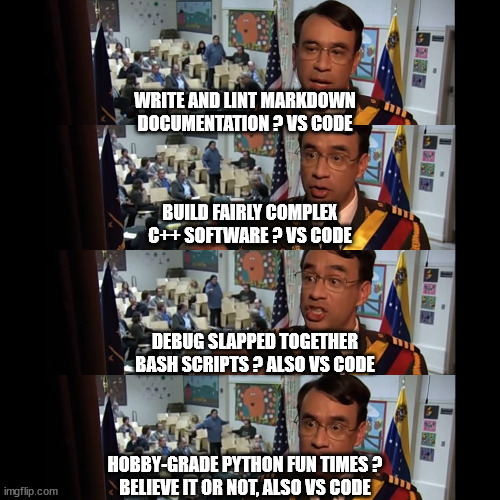I have not used an IDE since I ditched Turbo Pascal in middle school, but now I am at a place where everyone and their mother uses VS Code and so I’m giving it a shot.
The thing is, I’m finding the “just works” mantra is not true at all. Nothing is working out of the box. And then for each separate extension I have to figure out how to fix it. Or I just give up and circumvent it by using the terminal.
What’s even the point then?
IDK maybe its a matter of getting used to something new, but I was doing fine with just vim and tmux.
Hell no, Emacs and nvim UX is far superior. I won’t ever go back to clicking.
I use VS code, mainly for the jupyter notebook integration.
Idk where you got the “just works” idea from, but maybe you’re looking for something more like the jetbrains IDEs?
I still use the terminal all the time with VSC.
Yeah, I guess the idea of VSCode isn’t to be a “ready to use” IDE, but to be configurable — which it is.
The main thing that makes it popular nowadays is the ecosystem of plugins around it. Ex: when Copilot was released, I believe the VSCode plugin was the best one.
Also many frameworks docs have instructions on how to use it with VSCode and which plugins to install, such as some web frameworks and Flutter.
On top of being super bloated, Intellij’s Rider is far from “just working” in my experience. Not only is it super slow to boot, but it also changes asmdefs in my Unity project unprompted, in a way that prevents my project from working (creates cyclic dependencies). The debugger also sometimes doesn’t trigger breakpoints 😵💫
I absolutely despise it, viscerally.
I do. I used to juggle between Code::Blocks, PyDev, NetBeans and others, depending on projects. I find VS Code kind of fulfills the promise of Eclipse of being an all-purpose IDE, without the bloat Eclipse became synonymous with. It really clicked for me when I started using devcontainers. I am now a big fan of the whole development containers concept and use it in VS Code daily…

Code::Blocks
This still exists? I played around with it’s portable app eons ago.
development containers
How does that compare to Vagrant?
Code::Blocks is still chugging along, albeit at a glacial pace.
The rise of Docker has made containers very popular in the last 10 years or so. Nowadays you can run a single WSL2 VM on Windows with a Linux distro, and run any number of containers inside it. Vagrant is useful if you need full-fledged VMs for your environments.
Nope, at work, we use JetBrains IDEs and for my personal stuff, I’m using Kate.
Seeing the hype wave for VS Code was so bizarre, like millions of people discovered features that were just bog standard in IDEs for a long time. Two colleagues tried to sell it to me and the features they chose to do so with, were the commit GUI and the embedded terminal.
My best guess is that if you weren’t a programmer, then you didn’t use an IDE and there just wasn’t many good editors on Windows. Like, Notepad++ has been there since forever, but it doesn’t have that many features. And Sublime has been around for a long time, too, but never made it big.
The problem with Sublime is that it’s a paid one, and not everybody wants to pay for something that is perceived by the community as something that should be free and open source.
It’s paid like WinRAR is paid.
Sublime was pretty big before Atom. Atom just had absolutely abysmal startup speeds. Using Atom like an IDE was fine because it stayed open but using it like an editor was awful. Code fixed those problems.
The thing about VSCode is that it was lightweight and modular with the extensions. At least for me.
Lightweight compared to a full-featured IDE, sure, but it starts a whole bloomin’ web browser to render a text editor. That is not lightweight at all, compared to Notepad++, Sublime, Kate, Vim, Emacs etc…
Sublime Text with plugins. It’s 100% because it’s what I’m used to.
I agree, thought Atom was kind of a fun text editor but silly for being an entire Chrome browser, then it mutated into this intentionally held back IDE where not even developing PowerShell or C# can be done without mucking about first.
There is barely any functionality without add-ins but not because they want to keep the base program light. And it siphons all the data it can get, of course.
It’s pretty clear to me that they don’t want it to be better than Visual Studio proper, so you don’t get a sane menu structure or out of the box functionality. Microsoft made an editor that is somehow more opaque and unintuitive than vi, not because of necessity or for practicality reasons but because it has to be different from the flagship product.
I’d much rather work with Spyder, Netbeans or Eclipse. Or some Jetbrains product.
so you don’t get a sane menu structure
Not saying they shouldn’t have a sane structure, but in 6 years of using VS Code I never cared about menus because everything can and should be accessed through the command palette (F1 / Ctrl+Shift+P).
To me complaining about menus in VS Code sounds like complaining of modes and motions in vi / vim. Maybe the editor is not for you.
vi is the way it is for very good reasons, I don’t really see that with VS Code. Even gVim has menus. You can have both accessibility and flexibility/speed.
I would still try to adapt to it, but the PowerShell experience I had a couple months ago put me off it (and VSCodium) for good. Install IDE, install plug-in, hangs forever until you figure out that the useless error message means you need to install some additional .msi from Microsoft. Blergh.
use linux
lazyvim is enough for me.
The problems you’re facing aren’t very clear. Can you expand a bit?
Lots of things in VS Code just work if you use the non-FOSS version and don’t need to install any system dependencies. For example, there are a ton of code formatters that you can install and run without tuning (eg I installed a SQL formatted last week with nothing else to do). There are also some that you need underlying dependencies for (eg if you want Rust extensions to work, you need the Rust toolchain; same for LaTeX); however this is true in any editor based on my experience (although some editors eg JetBrains might mask that through their GUI). Across both options, you often need to tune your extensions based on your use case or even hardware in some cases (eg setting up nonstandard
PATHitems).YMMV for VSCodium, the FOSS version, primarily because it relies on a different extension registry per the terms of use. You can get around this as a user; as a vendor they cannot. Outside of tweaking the registry I’m not aware of anything else you need to do for parity.
Edit: forgot to tie all this back to my opener. What do you mean when you say it requires all sorts of work? Are you experiencing other issues than something I called out?
VSCode seems to have fun ignoring my “don’t guess encodings and assume this one” on files.
VSCodium respects that setting.
I was doing some Jinja templating in a Flask app the other day and VS Code would not respect my explicit file typing through the GUI over restarts. I had to change my file extensions and install an extension for Jinja syntax highlighting to get that to work.
I feel that pain.
I don’t think VSCode’s mantra is that it “just works”. It’s definitely a “platform” IDE like Eclipse was.
There are some things about it which are a bit annoying and not easy to initially work out, but overall I’ve found it to do pretty much everything I want, and a few things I didn’t know I wanted until I found out it did them.
everyone and their mother uses VS Code
This is usually a good reason to avoid something. Especially if that something comes from Microsoft.
So things stop being usable as soon as they become mainstream?
Monocultures are bad. Popularity very rarely tracks quality. And once something is overwhelmingly popular, it usually goes to shit, because the momentum is enough to keep it successful.
See: Windows. Outlook. Reddit. CrowdStrike.
But vscode hasn’t gone to shit…
Lots of things have also gotten popular without going to shit either.
Give it time. This is Microsoft we’re talking about. Look at GitHub or Skype.
I mostly use VS Code for notes and configuration files. Sometimes Python scripts. I agree with you, it requires a lot of setup. It has replaced Vim for me either way.
Most of my programming is done in IntelliJ, which works mostly out of the box. I’ve also used Visual Studio (not to be confused with VS Code).
I can’t imagine working without a proper IDE for any serious programming anymore. Working without IDE is like self imposed handicap.
This post reads like going to a Linux forum and asking for issues with the GTX660, which absolutely does not work on Linux: your concerns are legitimate and it’s reasonable not to buy all the good comments on VS Code based on your personal experience. However, it works on my machine. And it also works for many others.
You also mention to have been doing fine with “just vim”. I’d argue that you should face VS Code with the same humility you faced vim. If you’re up to the task, take your time to learn its quirks just like you did with Vim’s. Otherwise, you’re better off ending your career with the toolsuite you know for now.
I use Vim, more specifically Neovim with the LazyVim setup. It turns it into a full fledged IDE basically, with LSPs, hotkeys and everything setup. I started a few years ago with original Vim without plugins. I have 2 problems with my current setup: a) I don’t understand the complete setup and don’t know Lua enough, and b) LazyVim actually updates ton and sometimes things break.
And last time it broke something with my Rust setup, I could not find a solution quickly, but was working on a Rust project. So I installed VSCode the first time, but the Open Source version just called Code in the Linux repositories. But because it is Open Source, it does not come with the VSCode addon repository from Microsoft. I didn’t want do that, so I went back to solving the issue with my Neovim setup. Shortly after I found the solution and worked on my (little) project.
All in all, if you just want an out of the box experience without too much tinkering or problem solving, I wouldn’t recommend the Vim route. There is lot of stuff you have to setup, or at least change settings and understand how to do this. I assume the VSCode version from Microsoft has a better out of the box experience, from the just works perspective.










